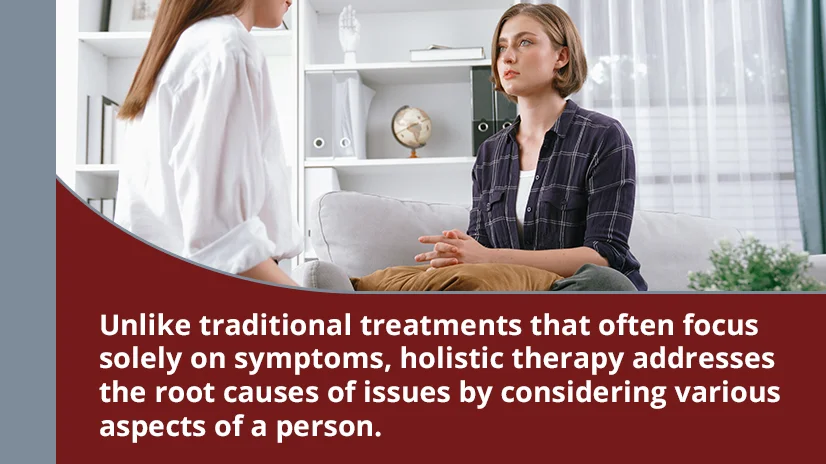
Comprehensive Care: Holistic Therapy For Mental Health
Holistic therapy for mental health is an integrative approach that considers the whole person, encompassing mind, body, and spirit, to promote overall well-being. This approach includes a variety of practices, such as mindfulness, meditation, yoga, acupuncture, and nutritional therapy.
By incorporating these diverse methods, holistic therapy encourages self-awareness and emotional healing, offering a comprehensive path to recovery. This article delves into the benefits of holistic treatment for mental health and the challenges and considerations involved.
Key Takeaways
Holistic approaches consider the whole person, promoting long-term mental wellness and sustainable healing. Here’s what you need to know:
- Holistic therapy techniques reduce stress, improve emotional regulation, and enhance self-awareness.
- Integrating holistic therapies with traditional treatments offers a comprehensive approach to mental health care.
- Emerging therapies and increasing acceptance within mainstream healthcare are shaping the future of holistic psychotherapy.
For professional mental health care and to explore our comprehensive services, contact Indiana Center for Recovery at (844) 650-0064.

Introduction To Holistic Therapy
Holistic therapy approaches mental health by considering the interrelation of the mind, body, and spirit. Unlike traditional treatments that often focus solely on symptoms, holistic therapy addresses the root causes of issues by considering various aspects of a person.
A holistic approach to mental health is crucial because it recognizes that many factors beyond the mind influence psychological well-being. These include physical health, social connections, spiritual needs, and environmental influences.
By addressing these interconnected aspects, holistic therapy aims to support mental health recovery more sustainably than approaches that focus solely on psychological symptoms. This inclusive approach encourages individuals to actively participate in their healing process, promoting empowerment and self-care.
Types Of Holistic Therapies
Holistic treatments encompass various approaches, offering diverse methods to enhance overall well-being and promote holistic health. Here are the major forms of therapy:
Mind-Body Therapies
Mind-body therapies focus on the connection between mental processes and physical health. Practices include:
Meditation and Mindfulness: Techniques that cultivate awareness and promote relaxation, reducing stress and enhancing emotional well-being.
Yoga and Tai Chi: Physical exercises combined with breathing and meditation techniques to improve flexibility, strength, and mental clarity.
These practices help cultivate a deeper mind-body connection, enhancing overall well-being through mindful awareness.
Energy-Based Therapies
Energy-based therapies work with the body’s energy fields to promote healing and balance. Examples include:
Reiki: A therapy that reduces stress, increases relaxation, and promotes healing by laying on hands.
Acupuncture: Traditional Chinese medicine involves inserting thin needles into definite points on the body to restore balance and alleviate pain.
They aim to restore harmony and alleviate stress by addressing energy blockages, promoting relaxation, and supporting physical and emotional healing.
Nature-Based Therapies
Nature-based therapies utilize natural environments to promote mental and emotional health. These include:
Ecotherapy: Engaging with nature to enhance well-being, often through outdoor activities like gardening or hiking.
Wilderness Therapy: Therapeutic interventions in natural settings that encourage personal growth and emotional healing through outdoor experiences.
Spending time outdoors in supportive environments can reduce stress, improve mood, and promote a connection with the natural world.
Lifestyle And Nutritional Therapies
These therapies focus on lifestyle choices and dietary habits to support mental and physical health:
Diet and Nutrition: Emphasizing whole foods, balanced nutrition, and dietary changes to improve mood, energy levels, and overall health.
Exercise and Physical Activity: Regular physical activity, tailored to individual needs and preferences, to enhance mood, reduce stress, and improve physical fitness.
Individuals can support their mental well-being and enhance overall vitality by implementing a balanced diet and making positive lifestyle changes.
Benefits For Mental Health
Holistic psychotherapy offers valuable tools and practices that alleviate symptoms and cultivate long-term resilience and well-being. Here’s how it can help:
Stress Reduction
Holistic therapies like meditation and yoga teach techniques to calm the mind and relax the body, reducing feelings of stress and tension. By practicing these methods regularly, individuals can develop resilience against everyday pressures and enjoy greater peace of mind.
Improved Emotional Regulation
Through practices such as mindfulness, individuals learn to observe and understand their emotions without judgment. This awareness allows for better management of emotional responses, fostering a sense of control and stability in challenging situations.
Enhanced Self-Awareness
Holistic therapies encourage introspection and self-reflection, helping people develop a deeper understanding of their thoughts, moods, and actions. This heightened self-awareness promotes personal growth, strengthens self-esteem, and empowers individuals to make better choices aligned with their values and goals.
Better Sleep Quality
Techniques like relaxation exercises and maintaining a balanced lifestyle support restful sleep patterns. By reducing stress and relaxing, alternative therapies can lessen insomnia and improve sleep quality. They also enhance mental clarity and daytime functioning.
Addressing different aspects of mental health issues through these approaches can improve mental health and people’s overall quality of life.
Integrating Holistic And Traditional Treatments
Integrating holistic therapies with traditional treatments combines different approaches to support overall health. It combines methods focusing on the whole person and targeting specific symptoms or conditions.
Complementary Vs. Alternative Approaches
Complementary therapies work alongside traditional treatments to enhance their effects, such as using acupuncture alongside medication. Alternative therapies, on the other hand, are used instead of conventional methods, like choosing herbal remedies instead of prescription drugs.
Collaboration With Healthcare Providers
Collaboration involves holistic therapists working with doctors and specialists. They share information and coordinate care to confirm that treatments work well together, offering patients comprehensive support. This teamwork allows for informed decision-making, effective treatment plans, and potential management of health conditions.
Creating A Personalized Treatment Plan
A personalized plan considers each person’s unique needs and preferences. It combines different therapies and treatments to create a tailored approach that addresses specific health goals and fosters holistic well-being. It considers factors like medical history, lifestyle, and therapeutic goals to tailor interventions that support holistic health.
By integrating holistic therapies with traditional treatments, individuals can benefit from a balanced approach to health care that addresses specific mental health conditions.
Challenges And Considerations
Despite the promising benefits of holistic therapy in promoting overall well-being, several challenges hinder its widespread adoption and effectiveness. Here, we explore the challenges:
Accessibility And Cost
Accessibility refers to how simply people can access holistic therapies. Sometimes, these therapies might not be available in all places or may be expensive, making it hard for everyone to benefit from them. Cost can be a barrier, as some holistic treatments might not be covered by insurance and can be expensive to pay for out-of-pocket.
Lack Of Standardization
Lack of standardization means that there are no set rules or standards that all holistic therapists follow. Different therapists have various ways of practicing, confusing people trying to find the right therapy. It also means there may not be clear guidelines on what works best or how to measure success.
Potential Risks And Contraindications
Risks refer to possible negative effects or outcomes from holistic therapies. While many are safe, some might not be appropriate for everyone, particularly those with certain medical conditions or allergies. Contraindications are situations where a treatment should not be used because it could cause harm instead of helping.
Navigating accessibility, standards, and safety concerns is vital in ensuring that therapies can be integrated safely and effectively into holistic mental health treatment plans.
Future Directions In Holistic Mental Health Therapy
Promising advancements and evolving perspectives mark the future of holistic mental health therapy. Several key areas are important in shaping its future:
Emerging Therapies
Holistic therapy is continually expanding with new therapeutic approaches and techniques. These may include innovative practices blending traditional and modern methods, such as neurofeedback, art therapy, and integrative medicine.
Increasing Acceptance And Integration
Overcoming stigma and increasing acceptance of holistic therapies within mainstream healthcare systems is crucial for their widespread integration. As more research validates their effectiveness and safety, holistic therapies are gaining recognition as valuable complements to conventional treatments.
Research And Development
Advancements in research are essential for advancing evidence-based treatments in holistic mental health therapy. Continued research into the mechanisms of holistic therapies, their impacts on mental health outcomes, and comparative studies with conventional treatments can provide valuable insights.
These developments are pivotal in shaping a comprehensive approach to mental health care that promotes holistic healing.
Frequently Asked Questions (FAQ)
A holistic approach is often used in healthcare and wellness contexts. It involves considering the person’s physical, mental, and emotional well-being and spiritual beliefs. It concentrates on treating the root causes of issues, not just symptoms. This approach integrates traditional medicine with complementary therapies like yoga or meditation.
It emphasizes lifestyle factors such as diet, exercise, and social support to improve overall quality of life. By nurturing all aspects of a person’s health, holistic methods create balance and promote long-term mental wellness.
A holistic therapist approaches healing by considering the interconnectedness of mind, body, and spirit. They integrate various therapeutic techniques, such as mindfulness, holistic counseling, yoga, and acupuncture, to address the whole person and mental health symptoms.
A holistic therapist employs expressive arts like dance, art, or music therapy to promote healing. Mindfulness approaches like meditation and relaxation are commonly used alongside physical practices like yoga or Tai Chi. Their goal is to foster comprehensive, personalized, and sustainable healing.
Holistic therapy offers a comprehensive approach to improving well-being by recognizing the connections between the mind, body, and spirit. It effectively addresses a variety of conditions including stress, anxiety, depression, and chronic pain through empowering techniques like acupuncture, yoga, meditation, and nutritional counseling.
Holistic approaches promote self-awareness, balance energy, and support the body’s natural healing processes. This integrative approach can also benefit individuals dealing with insomnia, digestive disorders, and substance abuse, offering personalized care that complements traditional medical treatments.



